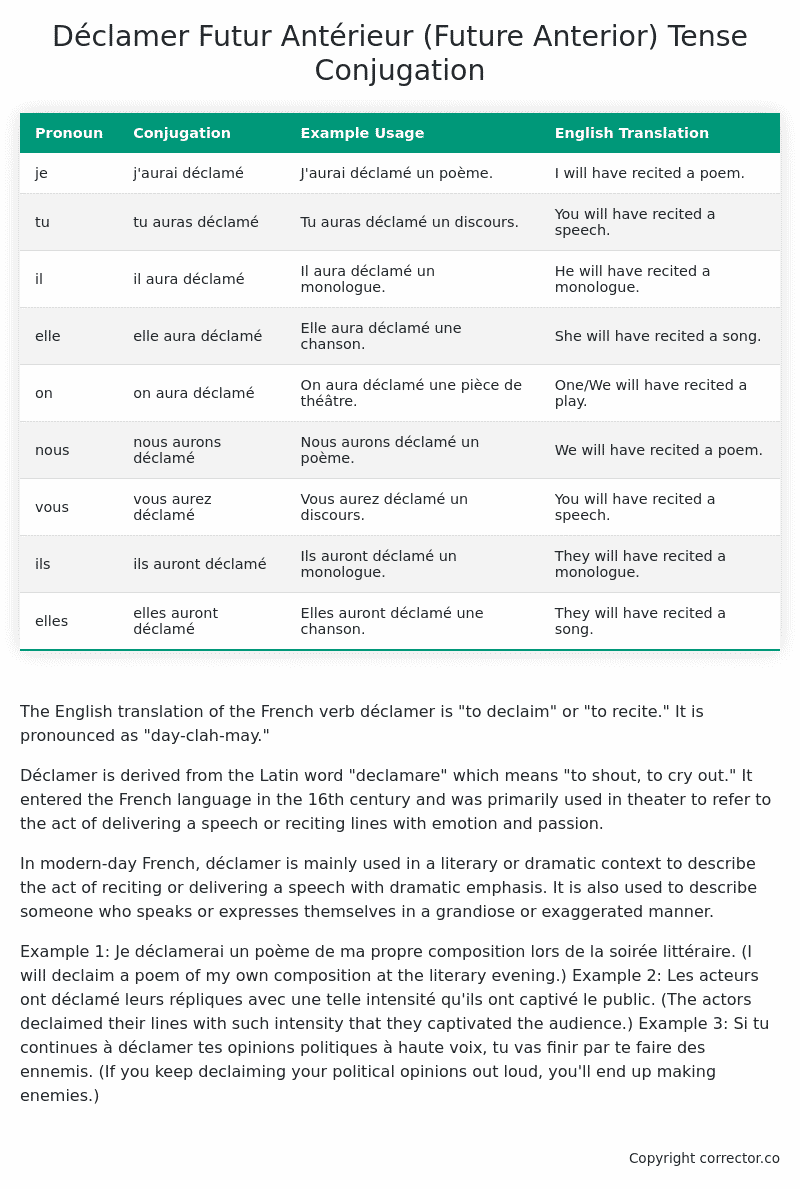Futur Antérieur (Future Anterior) Tense Conjugation of the French Verb déclamer
Introduction to the verb déclamer
The English translation of the French verb déclamer is “to declaim” or “to recite.” It is pronounced as “day-clah-may.”
Déclamer is derived from the Latin word “declamare” which means “to shout, to cry out.” It entered the French language in the 16th century and was primarily used in theater to refer to the act of delivering a speech or reciting lines with emotion and passion.
In modern-day French, déclamer is mainly used in a literary or dramatic context to describe the act of reciting or delivering a speech with dramatic emphasis. It is also used to describe someone who speaks or expresses themselves in a grandiose or exaggerated manner.
Example 1: Je déclamerai un poème de ma propre composition lors de la soirée littéraire. (I will declaim a poem of my own composition at the literary evening.)
Example 2: Les acteurs ont déclamé leurs répliques avec une telle intensité qu’ils ont captivé le public. (The actors declaimed their lines with such intensity that they captivated the audience.)
Example 3: Si tu continues à déclamer tes opinions politiques à haute voix, tu vas finir par te faire des ennemis. (If you keep declaiming your political opinions out loud, you’ll end up making enemies.)
Table of the Futur Antérieur (Future Anterior) Tense Conjugation of déclamer
| Pronoun | Conjugation | Example Usage | English Translation |
|---|---|---|---|
| je | j’aurai déclamé | J’aurai déclamé un poème. | I will have recited a poem. |
| tu | tu auras déclamé | Tu auras déclamé un discours. | You will have recited a speech. |
| il | il aura déclamé | Il aura déclamé un monologue. | He will have recited a monologue. |
| elle | elle aura déclamé | Elle aura déclamé une chanson. | She will have recited a song. |
| on | on aura déclamé | On aura déclamé une pièce de théâtre. | One/We will have recited a play. |
| nous | nous aurons déclamé | Nous aurons déclamé un poème. | We will have recited a poem. |
| vous | vous aurez déclamé | Vous aurez déclamé un discours. | You will have recited a speech. |
| ils | ils auront déclamé | Ils auront déclamé un monologue. | They will have recited a monologue. |
| elles | elles auront déclamé | Elles auront déclamé une chanson. | They will have recited a song. |
Other Conjugations for Déclamer.
Le Present (Present Tense) Conjugation of the French Verb déclamer
Imparfait (Imperfect) Tense Conjugation of the French Verb déclamer
Passé Simple (Simple Past) Tense Conjugation of the French Verb déclamer
Passé Composé (Present Perfect) Tense Conjugation of the French Verb déclamer
Futur Simple (Simple Future) Tense Conjugation of the French Verb déclamer
Futur Proche (Near Future) Tense Conjugation of the French Verb déclamer
Plus-que-parfait (Pluperfect) Tense Conjugation of the French Verb déclamer
Passé Antérieur (Past Anterior) Tense Conjugation of the French Verb déclamer
Futur Antérieur (Future Anterior) Tense Conjugation of the French Verb déclamer (this article)
Subjonctif Présent (Subjunctive Present) Tense Conjugation of the French Verb déclamer
Subjonctif Passé (Subjunctive Past) Tense Conjugation of the French Verb déclamer
Subjonctif Imparfait (Subjunctive Imperfect) Tense Conjugation of the French Verb déclamer
Subjonctif Plus-que-parfait (Subjunctive Pluperfect) Tense Conjugation of the French Verb déclamer
Conditionnel Présent (Conditional Present) Tense Conjugation of the French Verb déclamer
Conditionnel Passé (Conditional Past) Tense Conjugation of the French Verb déclamer
L’impératif Présent (Imperative Present) Tense Conjugation of the French Verb déclamer
L’infinitif Présent (Infinitive Present) Tense Conjugation of the French Verb déclamer
Struggling with French verbs or the language in general? Why not use our free French Grammar Checker – no registration required!
Get a FREE Download Study Sheet of this Conjugation 🔥
Simply right click the image below, click “save image” and get your free reference for the déclamer Futur Antérieur tense conjugation!

Déclamer – About the French Futur Antérieur (Future Anterior) Tense
Construction
Common Everyday Usage Patterns
Interactions with Other Tenses
For example
Summary
I hope you enjoyed this article on the verb déclamer. Still in a learning mood? Check out another TOTALLY random French verb conjugation!


